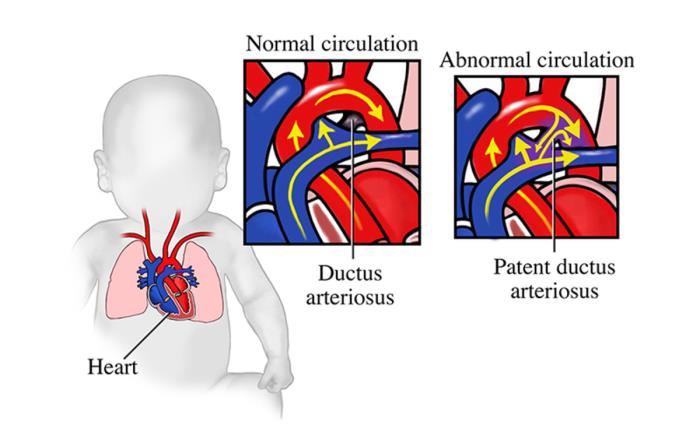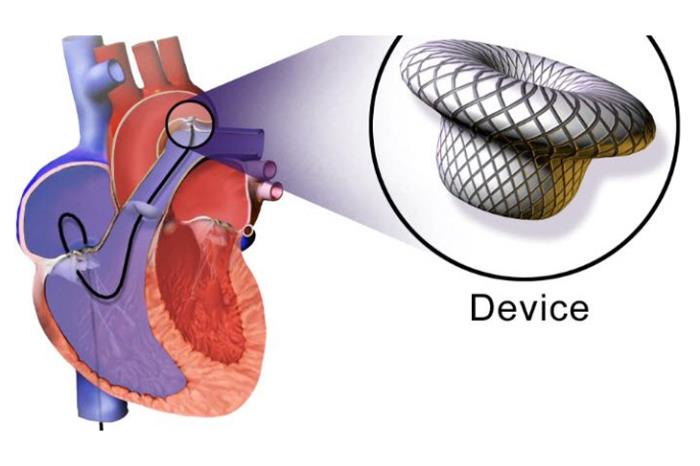Patent Ductus Arteriosus (PDA) is a congenital heart defect that occurs when the ductus arteriosus a blood vessel that connects the pulmonary artery to the aorta fails to close after birth. In children, this condition can lead to increased blood flow to the lungs, resulting in respiratory problems and heart failure if not addressed promptly. Understanding PDA is critical for pediatricians, cardiologists, and parents, as timely intervention can significantly improve outcomes for affected children.
Medical disclaimer: This content is for general awareness and does not replace a doctor’s consultation. For diagnosis or treatment decisions, consult a qualified specialist.
The Importance of Pediatric Cardiology in Congenital Heart Conditions
Pediatric cardiology plays a vital role in managing congenital heart conditions like PDA. Specialists in this field are trained to recognize the unique anatomical and physiological differences in children's hearts, enabling them to diagnose and treat conditions effectively. The expertise of pediatric cardiologists is essential for ensuring that children with PDA receive appropriate care tailored to their developmental needs, helping to minimize the risks of long-term complications associated with untreated PDA.
Initial Assessment: How Pediatric Cardiologists Diagnose PDA
The diagnosis of PDA typically begins with a thorough medical history and physical examination. Pediatric cardiologists will assess the child for symptoms such as rapid breathing, fatigue, poor feeding, and growth delays. Auscultation of the heart may reveal a characteristic heart murmur, a key indicator of PDA. If PDA is suspected, the cardiologist will proceed with further diagnostic testing to confirm the presence of the defect and evaluate its impact on the child's heart function.

Comprehensive Evaluation Techniques for PDA
Once PDA is suspected, a comprehensive evaluation is necessary to understand the defect's size and effects on the cardiovascular system. This evaluation often includes non-invasive imaging techniques such as echocardiography, which uses sound waves to create detailed images of the heart's structure and function. In some cases, additional imaging modalities like chest X-rays or cardiac MRI may be employed to gather more information about the heart and lungs, providing a complete picture of the child's condition.
Role of Echocardiography in PDA Management
Echocardiography is a cornerstone in the diagnosis and management of PDA in children. This imaging technique allows pediatric cardiologists to visualize the ductus arteriosus and assess its size, shape, and the direction of blood flow. Doppler ultrasound, a component of echocardiography, can measure the blood flow velocities and pressure gradients, helping to evaluate the severity of the PDA. The ability to monitor the PDA over time using echocardiography is crucial for determining the need for intervention and guiding treatment decisions.
The Importance of Early Detection in Pediatric Patients
Early detection of PDA is vital for preventing potential complications such as pulmonary hypertension, heart failure, and growth delays. When diagnosed early, PDA can often be managed with less invasive treatment options, reducing the need for surgical intervention. Regular check-ups and screenings for high-risk infants, particularly premature babies or those with a family history of heart defects, are essential for identifying PDA before it leads to more severe health issues.
Treatment Options: Medical vs. Surgical Approaches
The treatment of PDA in children may involve both medical and surgical approaches, depending on the severity of the condition and the child's overall health. In some cases, medications such as non-steroidal anti-inflammatory drugs (NSAIDs) may be prescribed to help close the ductus arteriosus, particularly in premature infants. However, if medical management is ineffective or if the PDA is significant, surgical intervention may be required. Surgical options include catheter-based techniques for device closure or open-heart surgery to ligate the ductus arteriosus. The choice of treatment is tailored to the individual needs of the child, taking into consideration factors such as age, size, and overall cardiac function.
The Role of Pediatric Cardiologists in Non-Invasive Treatment
Pediatric cardiologists play a crucial role in the non-invasive management of patent ductus arteriosus (PDA), employing techniques such as echocardiography and advanced imaging to diagnose and monitor the condition. They work to determine the best course of action, focusing on minimizing invasive procedures while ensuring effective care for young patients.
Interventional Techniques: When Device Closure Is Necessary
While many cases of PDA can be managed non-invasively, some situations require interventional techniques, such as catheter-based device closure. Pediatric cardiologists assess the size of the ductus arteriosus, the child’s overall health, and any associated complications to decide if device closure is necessary. This intervention can effectively prevent potential complications and improve cardiac function.

Multidisciplinary Approach: Collaborating with Other Healthcare Providers
A multidisciplinary approach is essential in managing PDA. Pediatric cardiologists collaborate with pediatricians, surgeons, and other specialists to provide comprehensive care. This collaboration ensures that all aspects of a child’s health are considered, leading to better outcomes and more coordinated treatment plans.
Ongoing Monitoring: Follow-up Care for Children with PDA
Regular follow-up care is critical for children diagnosed with PDA. Pediatric cardiologists develop individualized monitoring plans, which may include routine echocardiograms and clinical assessments to track the condition’s progression and address any emerging concerns promptly.
Managing Comorbidities: Addressing Associated Health Issues
Children with PDA often have associated comorbidities that need to be addressed. Pediatric cardiologists play a key role in managing these conditions, whether they involve respiratory issues, growth concerns, or other cardiac complications. Comprehensive management of comorbidities is essential for optimizing the child’s overall health and quality of life.
Patient and Family Education: Empowering Caregivers
Educating patients and their families about PDA and its management is a fundamental responsibility of pediatric cardiologists. They provide information on the condition, treatment options, and lifestyle adjustments, empowering caregivers to make informed decisions and actively participate in the child’s care.
Psychological Support for Families Dealing with PDA
The diagnosis and management of PDA can be emotionally challenging for families. Pediatric cardiologists recognize the importance of psychological support, often collaborating with mental health professionals to provide resources and guidance to families coping with the stresses associated with a child's heart condition.
Innovations in Pediatric Cardiology: Advances in PDA Treatment
Pediatric cardiology is continually evolving, with new techniques and technologies emerging for the management of PDA. Innovations such as minimally invasive closure devices and advancements in imaging technology are enhancing the ability to diagnose and treat PDA more effectively, leading to improved patient outcomes.
Research and Clinical Trials: The Future of PDA Management
Ongoing research and clinical trials are vital for advancing the understanding and treatment of PDA. Pediatric cardiologists often participate in these studies, contributing to the development of new therapies and strategies that may improve care for future patients.
The Importance of Lifelong Care for Patients with PDA
Lifelong care is critical for individuals with a history of PDA, as they may face ongoing health issues. Pediatric cardiologists ensure a seamless transition to adult care, providing patients with continued monitoring and management as they grow older.
Transitioning Care: From Pediatric to Adult Cardiology
Transitioning from pediatric to adult cardiology care requires careful planning and communication. Pediatric cardiologists play an essential role in preparing patients and their families for this transition, ensuring that they have the necessary support and resources to navigate their ongoing cardiac care.
Case Studies: Successful Management of PDA in Children
Documenting case studies of successful PDA management provides valuable insights into effective treatment approaches. These stories highlight the impact of early detection, multidisciplinary collaboration, and innovative treatment techniques, serving as inspirational examples for both healthcare providers and families.
Latest Innovations in PDA Device Closure Techniques
Stay informed about the latest innovations in PDA device closure. This section discusses cutting-edge technologies and techniques that enhance the safety and effectiveness of the procedure, providing better outcomes for patients.
Risks Involved in Patent Ductus Arteriosus Complications and Long-term Effects
Explore the risks and long-term effects associated with PDA. This section outlines potential complications if left untreated, as well as risks involved in surgical intervention, helping patients make informed decisions.
Conclusion: The Crucial Role of Pediatric Cardiology in PDA Outcomes
The role of pediatric cardiology in the management of PDA is vital for ensuring positive health outcomes in children. Through non-invasive treatments, interventional procedures, and ongoing care, pediatric cardiologists contribute significantly to the long-term well-being of patients with PDA.
Best PDA Device Closure in India
The Best PDA Device Closure in India offers a minimally invasive solution to close the patent ductus arteriosus, helping prevent complications and improve heart function in affected patients.
Best PDA Device Closure Hospitals in India
The best pda device closure hospitals in india are equipped with advanced technology and expert pediatric cardiology teams, ensuring comprehensive care for successful outcomes.
PDA Device Closure Cost in India
The pda device closure cost in india is affordable, offering patients accessible pricing and high standards of care across specialized hospitals.
Best PDA Device Closure Surgeons in India
The Best PDA Device Closure Surgeons in India are experts in pediatric heart procedures, providing skilled and compassionate care tailored to each patient’s needs.
FAQ
How do pediatric cardiologists diagnose patent ductus arteriosus?
Pediatric cardiologists diagnose PDA primarily through echocardiography, which provides images of the heart and blood flow, along with physical examinations and patient history.
What treatment options are available for children with PDA?
Treatment options include monitoring, medication, and interventional procedures such as catheter-based device closure or surgical intervention when necessary.
Why is early detection of PDA important in pediatric patients?
Early detection of PDA is crucial to prevent complications such as heart failure, pulmonary hypertension, and growth delays, ensuring timely and effective management.
How does pediatric cardiology support families of children with PDA?
Pediatric cardiology provides comprehensive education, emotional support, and resources to help families understand the condition and manage their child’s care effectively.
What innovations are being made in the management of PDA?
Innovations include advancements in minimally invasive closure devices, improved imaging techniques, and ongoing research into new treatment strategies, enhancing overall patient care.